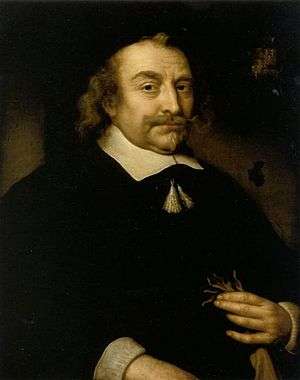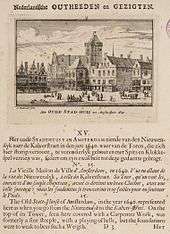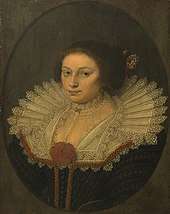Cornelis Bicker
Cornelis Bicker (25 October 1592 – 15 September 1654), heer (lord) Van Swieten and of Kasteel Swieten, was a regent of the Dutch Republic and a governor of the Dutch West India Company. He was also a sugar merchant, hoogheemraad of the Hoogheemraadschap van Rijnland and a counsellor of the States of Holland and West Friesland for Amsterdam at The Hague.

Born in Amsterdam, he was a member of that city's Bicker family - along with their allies the De Graeff family, they controlled Amsterdam's city government and the province of Holland for half a century. Both families were powerful and influential between the 1640s and 1672 during the height of the Republic's power.[1]
Life

In 1617 he and his new wife settled at Singel 130 in Amsterdam, in a building which his family only sold in 1767. In 1622 later Bicker became governor of the West India Company and also held several directorships, such as of the Amsterdamse Wisselbank. In 1628 he became a schepen. In 1632 he bought the Swieten estate and manorhouse from Hugo Cuyk van Mierop - from these he later derived his title.[2][3] In 1634 he was appointed a captain in the militia or schutterij. He was mayor of Amsterdam in 1646, 1650 and 1654. In 1647 he became a deputy for East Friesland at the States General.
Cornelis Bicker supported his brother Andries, Jacob de Witt and Cornelis de Graeff in the signing of the Peace of Münster and in May 1650 supported a proposal that suggested military cutbacks to encourage peace efforts. On 30 July 1650 he activated the militia to defend against an attack on Amsterdam by William II of Orange after being warned of William's approach by a postman travelling from Hamburg to Amsterdam, who passed on the news to Bicker's nephew (via his brother, the former mayor Andries) Gerard Bicker, then the bailiff or drost of Muiden. Gerard set off for Amsterdam immediately and after receiving the news Cornelis and Andries raised the bridges, shut the gates and deployed artillery. The attack failed but after the attack De Graeff passed on a message from William that Cornelis and Andries must resign from their posts on the town council. However, they were restored to them on 22 November the same year.
In art

Blick commissioned a large-format portrait of himself and his family from Cornelis van der Voort in 1618. Cornelis Bicker also appears as a captain in a 1638 militia group portrait by Joachim von Sandrart, commissioned by the Kloveniersdoelen to mark the visit of Maria de Medici and now in the Rijksmuseum in Amsterdam.[4][5] Another painting of Blick dates to 1654 and is attributed to Govert Flinck - this work was praised by Vondel.[6] His wife was also painted by David Bailly.[7]
Family, marriage and issue
Cornelis was the son of Gerrit Bicker and Aleyd Andriesdr Boelens. His brothers were Andries, Jacob and Jan. In 1617 he married Aertge Witsen (1599–1652) - they had five children:
- Margaretha, married Gerard van Hellemond and Cornelis Geelvinck
- Alida, married Lambert Reynst
- Elisabeth, married her cousin Andries de Graeff
- Maria, married Gerbrand Ornia
- Dr. Gerard Bicker (I) van Swieten (1632–1716), married Catharina van Sypesteyn.
References
- (in Dutch) Biography of Andries Bicker on DBNL
- (in Dutch) Het kasteel Zwieten te Zoeterwoude
- (in Dutch) Het Kasteel Swieten
- (in Dutch) http://www.rijksmuseum.nl/aria/aria_assets/SK-C-393?lang=nl
- Captain Bicker's company ready to receive Maria de Medici in September 1638, (ca 1638-40), by Joachim von Sandrart (Rijksmuseum Amsterdam)
- (in Dutch)Poem by Vondel
- (Rijksmuseum)
Bibliography
| Wikimedia Commons has media related to Cornelis Bicker. |
- Jonathan I. Israel: The Dutch Republic: Its Rise, Greatness, and Fall: 1477-1806. Clarendon Press, Oxford 1995, ISBN 978-0-19-820734-4
- (in Dutch) Cornelis Bicker - Biography on DBNL
- (in Dutch) Kernkamp, G.W. (1977) Prins Willem II 1626-1650
- (in Dutch) P. Burke: Venetië en Amsterdam. Een onderzoek naar de elites in de zestiende eeuw. 1974
- (in Dutch) J.E. Elias, De Vroedschap van Amsterdam 1578-1795, deel 1 (Haarlem 1903), p. 175
- (in Dutch) Zandvliet, Kees De 250 rijksten van de Gouden Eeuw - Kapitaal, macht, familie en levensstijl (2006 Amsterdam; Nieuw Amsterdam Uitgevers)